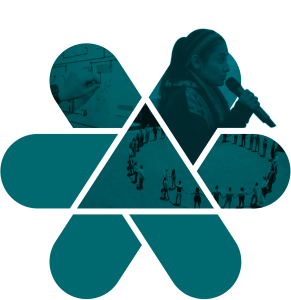Plan International initiated a pilot project to direct-fund and mentor youth-led organisations in Latin America with core and flexible funding to enable them to adapt to risks as they arose.
Download case studyLee el estudio de caso

In response to shrinking civic space in Latin America – alongside the ambition to shift power dynamics and improve partnerships with youth-led organisations – Plan International initiated a pilot project to direct-fund and mentor youth-led organisations in the region with core and flexible funding to enable them to adapt to risks as they arose. This saw Plan fundamentally change its approach to supporting youth-led organisations so that they could act more independently, while Plan worked in solidarity alongside them. A risk-analysis tool on the enabling environment was created to accompany this process so that both Plan and youth-led organisations could manage closing space conditions more effectively.
Securing buy-in
It is challenging to maintain the principles of transparency and full participation. These principles are often difficult to maintain because of conflicting donor requirements. In this instance, making the case for the key difference between direct funding and supporting groups via intermediaries, and advocating for more flexibility when reporting on and auditing the funds, was a challenge. The hope is that through this project, Plan can demonstrate to donors the balance needed between accountability on the one hand, and supporting youth-led organisations and new leadership on the other. This is especially relevant in contexts of high risk where capacities need to be strengthened in order to build resilience in the face of closing space. In this case, Sida’s flexibility and ambition to strengthen civil society made the project possible.
Generational differences
There is a generational issue to overcome. Many of those working in international civil society organisations (ICSOs) have a vision for the world and for society informed by parameters and ideologies set several decades ago. This means they risk missing out on what young people see as change, in terms of political participation, trust in democracy, how to build solidarity or connect. For effective partnership and solidarity, there needs to be transparent conversations – and active listening – on what all stakeholders expect of change.
Balancing risks and rationale
It was important for Plan to be able to articulate why it wanted to work with youth-led organisations. This connects to risk analysis, and how far an ICSO will go when acting in solidarity with youth. Without answering this question, an ICSO risks constantly coming up against the barrier of not being willing to take that risk.
Solidarity requires courage
The support of empowered staff at the technical level within Plan country offices was key to the success of the pilot project. Importantly, there were courageous staff willing to take on the additional challenges and risks of working more directly with and mentoring youth.
Involving the right decision-makers
Involvement of finance staff was key. Plan’s financial procedures are generally strict, with limited flexibility, and so it was necessary to have the buy-in of finance staff for a project that aimed to change the way local, youth-led organisations were supported.
Agency
Ensuring that the youth-led organisations themselves drove the project’s agenda was vital to developing Plan’s understanding of how to contribute to the strengthening of the resilience of these organisations. For example, work on sexual and reproductive rights (SRR) in Nicaragua revealed how sexual identity had become deeply politicised and how SRR were therefore a political issue. The awareness of this was important to ensure Plan could fully assess risks and responsibilities when working with youth-led organisations on those rights in that context.
Energy needs support
The pilot project revealed that although the youth-led organisations involved need opportunities to learn, alongside certain tools, most of the time they are ready to organise themselves without further intervention. ICSOs and donors have a tendency to suppress energy and leadership that is already there, as they impose northern-led systems. This energy is vital in advocating for an enabling environment for civil society more broadly – it must be strengthened through flexible support and solidarity.
-
The pilot phase of this project has now been completed and evaluated. The model is currently being scaled up across the region into a new phase that will run until the year 2024 involving 15 youth-led organisations and networks.
-
The cross-regional connections that were made, along with Plan’s international presence, contributed to the sense of solidarity between the youth-led organisations on these challenging topics.
-
Quote from the evaluation: “It is evident that Youth Organizations were strengthened from the Pilot Project. Their strengths can be seen in… the optimal use of resources and general organizational capacities. It is also evident… the maturity that Youth Organizations achieved throughout the project, their regional and national projection, and therefore their ability to have more political influence, as well as the ability to create new alliances and obtain new resources. Clearly, the Pilot was highly beneficial for all Youth Organizations and for strengthening new capacities in the people who comprise them.”